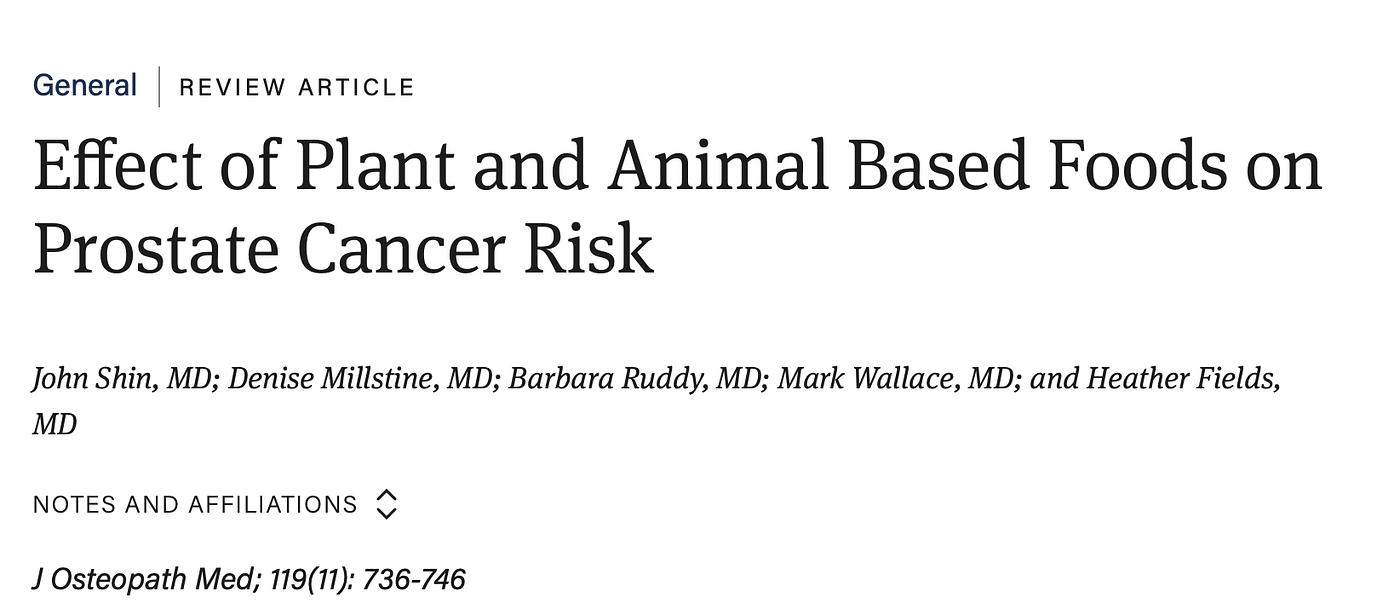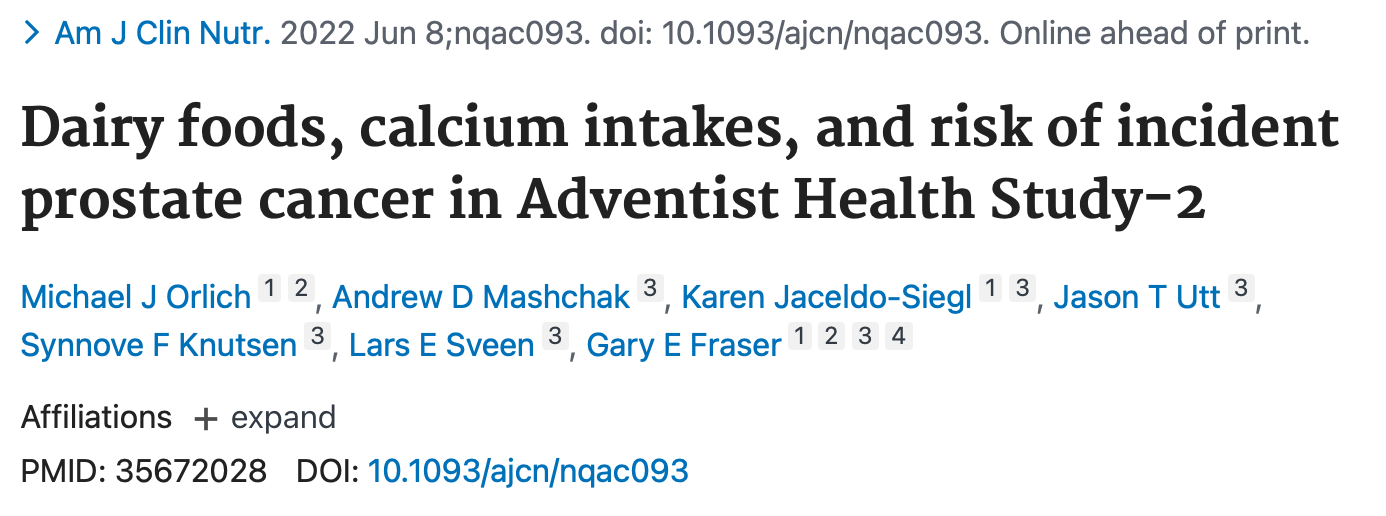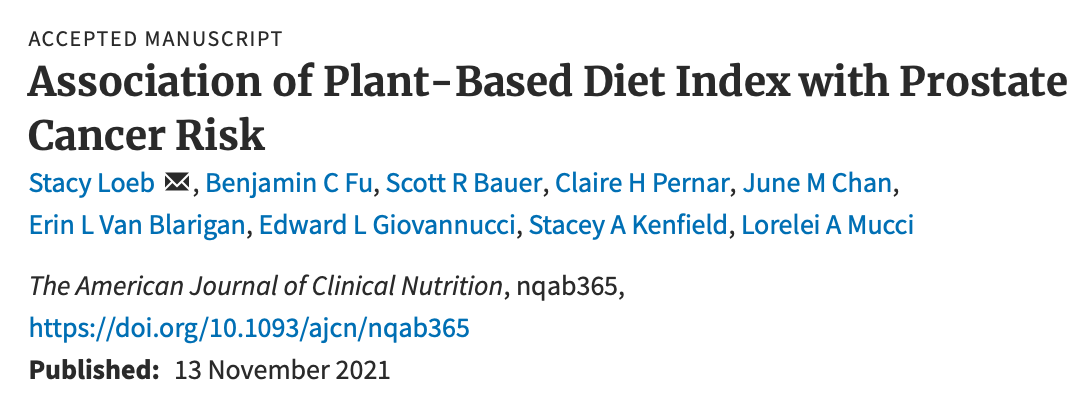A review of the week’s plant-based nutrition news 16th October 2022
This week I focus on prostate cancer. It is a cancer for which there is a good level of evidence to support a plant-based diet for prevention and survival.
Prostate cancer is the commonest cancer in men in the UK, and the second commonest in men globally, with 1,414,259 new cases per year accounting for 7.8% of all cancers.
Over the last few year we have seen more and more data supporting plant-based, lifestyle interventions for the prevention of prostate cancer. The seminal study by Dr Dean Ornish published in 2005 demonstrated that an intensive lifestyle intervention, which included a plant-based diet, could halt the progression of early-stage prostate cancer. He was able to show potential mechanisms at play, including changes in gene expression favouring cancer suppression and lengthening of telomeres. More recently, a study published in JAMA showed the efficacy of an exercise intervention in men with early stage prostate cancer and a study published in the journal Science was able to show that a compound found in cruciferous vegetables was able to favourable alter gene expression in prostate cancer cells.
You can read my updated article on the topic here. You can find the World Cancer Research Fund’s interactive cancer risk matrix here.

DIET AND PROSTATE CANCER RISK: Back in 2019, researchers from the Mayo clinic in the US published an updated review of the literature to investigating the association of plant- and animal-based food consumption with prostate cancer risk. 47 studies from 2006–2017 met the inclusion criteria, including 2 very large cohort studies (≥100,000 participants), 6 large cohort studies (≥40,000 participants), 11 medium cohort studies (≥10,000 participants), 10 small cohort studies (<10,000 participants), 13 case-control studies, 4 meta-analyses, and 1 population study investigating diet and PCa risk.
The results show ‘that, in general, plant-based foods may be associated with a decreased risk of prostate cancer, whereas dairy products may be associated with an increased risk of prostate cancer’.

LOWER RISK OF PROSTATE CANCER IN THOSE AVOIDING MEAT CONSUMPTION: A study from earlier this year examined the impact of different diet patterns and specifically the impact of meat consumption on the risk of various cancer. The study included 472,377 adult participants of the UK Biobank study with a mean age in the 50’s at recruitment and followed for 11.4 years. Participants were categorised into regular meat-eaters (n = 247,571), low meat-eaters (n = 205,385), fish-eaters (n = 10,696), and vegetarians (n = 8685). Regular meat eaters consumed meat more than 5 times per week. Low meat eaters, less than 5 times per week. The vegetarian group included 466 vegans. Participants also had blood measurements of insulin-like growth factor 1 (IGF-1), testosterone and sex hormone binding globulin. During the follow-up period 54,961 cancers were diagnosed.
One of the most significant findings was that in men, not eating meat was associated with a 20% reduction in the risk of prostate cancer and being vegetarian reduced the risk by 31%. This is a pretty major finding.
There are mixed results from the two main prospective cohorts that include a significant number of vegetarian and vegan participants. In the Adventist Health Study 2, vegan men (but not vegetarians) had a 35% reduction in risk of prostate cancer. Whereas, in the EPIC-Oxford study, although vegans and vegetarians had significantly lower risk of developing cancer overall (19% reduction), there wasn’t a significant reduction in risk of prostate cancer per se. This may be because of the smaller numbers of vegan participants compared to the AHS-2 cohort, as the results did suggest a trend to a lower risk.

DAIRY AND PROSTATE CANCER: We have known for a while that there may be is an association between dairy consumption and an increased risk of prostate cancer. This is acknowledged by the World Cancer Research Fund but the strength of evidence is considered weak or limited given that not all studies confirm this association and a dose response is not always apparent. In their summary they state that in general, studies show that 400g (386ml milk) of total dairy consumption per day increases the risk of prostate cancer by around 7%. It has been postulated that it may be the calcium in dairy that causes this increased risk given that there are also data suggesting higher consumption of calcium from all sources increases the risk of prostate cancer. The mechanism may be that higher intakes of calcium down regulates the formation of vitamin D3, which drives cell proliferation. The other proposed mechanism is that higher exposure to the growth factor IGF-1 through dairy consumption is increasing cancer risk.
It is good to have this analysis from the Adventist Health Study-2 cohort in which researchers have assessed the contribution of both dairy consumption and calcium separately, with the inclusion of participants who are vegan and thus do not consume dairy and obtain calcium from alternate sources. The study included 28,737 Seventh-day Adventist men in the United States and Canada, of whom 6389 were of black ethnicity. 11.7% (3370 participants) had very low (≤10 g/d) or no intake (2302 participants) of dairy. In total, 1254 (190 advanced) cases of prostate cancer were diagnosed during an average 7.8 years of follow-up. Participants were analysed in quintiles of dairy consumption with comparisons made between the midpoints of the upper and lower quintiles of dairy consumers (430 versus 20.2 g/d).
The results showed that men consuming 430g/d of dairy compared to those consuming 20.2g/d had a 27% increased risk of developing prostate cancer. The association was similar for advanced and non-advanced cases of cancer, in people of black ethnicity and after excluding vegans from the analysis. The major rise in risk of prostate cancer was seen to occur between the zero intake category and second quintile of the dairy users, with the risk then remaining high but plateauing. Compared to participants consuming zero dairy, those consuming the most had a 60% increased risk. The increased risk was mainly seen with the consumption of milk with no association found for cheese and yogurt. In contrast, higher intakes of non dairy and supplemental calcium did not increase the risk of prostate cancer.
The authors conclude ‘these data from a population with a wide range of dairy and calcium exposure do not clearly support a connection between calcium intake and prostate cancer. However, they do suggest that risk of prostate cancer is causally associated with higher intake of dairy products or some unknown causal factor that is strongly associated with dairy intake’. I think its time to seriously rethink our reliance on dairy for nutrients. We can definitely do better.
Regardless of the strength of evidence, we can make better choices. In the Adventist Health Studies, consumption of soya milk was associated with significant reduction in risk of prostate cancer in men and breast cancer in women. Soya consumption in general has been associated with a reduced risk of prostate cancer.

DAIRY AND PROSTATE CANCER IN JAPAN: This paper reports findings from the Japan Collaborative Cohort study, which included 26,464 men (age range: 40–79 years) from 24 Japanese districts who completed a a questionnaire survey during 1988–1990. The survey collected data on the consumption of dairy, including milk, cheese, butter, and yogurt. Frequency was classified into 5 groups, “seldom,” “once or twice a month,” “once or twice a week,” “three or four times a week,” and “almost every day.”
During the 697,777 person-years of follow-up, there were 412 cases of prostate cancer. The risk of prostate cancer in men consuming the most milk (almost every day) was 37% higher compared to men consuming the least (seldom or once or twice a month) with a dose-response apparent. Yogurt cheese and butter consumption when comparing high and low consumers did not show a significant impact on prostate cancer risk although for butter consumption there was a significant dose–response relationship. However, after adjusting for both BMI and total energy intake the consumption of milk and yogurt was associated with an even more significant positive risk, 48% and 68% increase respectively, with a dose-response apparent. This suggests that being overweight may mask the negative impact of dairy consumption.
Most prior studies on dairy consumption and prostate cancer have been reported in White populations. Prostate cancer incidence used to be low in Japan but has recently increased and this appears to in line with an increase in dairy consumption. According to The National Health and Nutrition Survey in Japan, intake of dairy products increased from 103.5g/day in 1975 to 122.2g/day in 1988 and increased 125.1g/day in 2009. Prior studies on dairy consumption and prostate cancer in Japanese people have yielded conflicting results. However, the prospective nature of the current study and the dose-response finding lends weight to the current results.
Why might dairy increase the risk of prostate cancer. One important mechanism is that dairy and indeed diets high in animal products, result in higher blood levels of IGF-1. This growth factor stimulates cells to grow and is associated with an increased risk of cancer in general. We know that the levels of IGF-1 in people that don’t consume animal products (vegans) are significantly lower than in those that do and the risk of cancer in general is lower in those following a vegan diet.
A recently published systematic review on milk consumption and prostate cancer concludes ‘The overwhelming majority of the studies included in this systematic review were suggestive of a link between milk consumption and increased risk of developing prostate cancer’. In addition, dairy consumption after a diagnosis of prostate cancer may increase the risk of death. A meta-analysis of 12 prospective studies has also implicated dairy protein in the observed increased risk of prostate cancer, specifically in men consuming ≥ 30 grams/day.

PLANT-BASED DIETS AND PROSTATE CANCER: This study uses my favourite plant-based diet index (PBDI) to analyse dietary data. Developed by researchers at Harvard University, the PBDI, is a way of scoring food frequency questionnaire data to assess the impact of a plant-based dietary pattern without necessarily including vegan or vegetarian participants. You can read my previous summary on the index here.
This study, for the first time, assessed the impact of adherence to the PBDI on the risk of prostate cancer in 47,239 men participating in the Health Professionals Follow-up Study. During the 20.7 years of follow up, 6,655 men were diagnosed with prostate cancer, including 515 men with advanced stage at diagnosis, 956 with lethal disease (metastasis or death) and 806 prostate cancer deaths (fatal). Greater adherence to an overall plant-based diet was associated with a 19% significantly lower risk of fatal prostate cancer. In men age <65 years, greater adherence to a healthy plant-based diet was associated with a 16% lower risk of total prostate cancer and a 44% reduction in lethal prostate cancer (prostate cancer death or distant metastasis) and 38% reduction in fatal prostate cancer (prostate cancer death). However, there were no associations between overall or healthy PBDI and prostate cancer in men ≥65 years. Surprisingly, more unhealthful plant-based foods were associated with a lower risk of lethal and fatal prostate cancer in men over age 65 years. This suggests that so called unhealthy plant foods may not be detrimental as such in the context of prostate cancer, but this would need confirmation in future studies.
There are several proposed reasons for these findings, including the anti-inflammatory potential of plant-based diets, the avoidance/limitation of dietary carcinogens and lower levels of IGF-1 when avoiding meat and dairy.
Of course, this study cannot be extrapolated to make conclusions about vegetarian or vegan diet as <1% of participants followed such a diet pattern with the rest still consuming animal foods. However, the data do support the international cancer prevention guidelines which state ‘Make wholegrains, vegetables, fruit and pulses (legumes) such as beans and lentils a major part of your usual daily diet’.

GOOD NEWS FOR COFFEE LOVERS: Although not necessary in the diet, coffee consumption does seem to have some benefits for health for those that enjoy it. Regarding cancer, there is consistent evidence for reduction in the risk of liver and colorectal cancer. This paper examines the impact of coffee consumption on the risk of prostate cancer
The study included data from 16 prospective cohort studies with 57 732 cases of prostate cancer and 1, 081 586 participants. Compared to those drinking the least, those drinking the most had a 9% reduction in risk of prostate cancer. In the dose–response analysis, a reduction in the risk of prostate cancer of nearly 1% was observed for each increment of one cup of coffee per day.
There are a number of possible reasons for these finding that the authors discuss. Caffeine, caffeic acid and chlorogenic acid in coffee may be responsible for this benefit. These compounds have been shown to improve insulin sensitivity, decrease insulin and insulin-like growth factor levels and increase levels of sex hormone binding globulin and testosterone. These compounds also have anti-oxidant and anti-inflammatory properties.
Clearly, such a study merely confirms an association rather than causal relationship, nonetheless, for those that enjoy drinking coffee, there may be benefits to health too. An umbrella study from 2017 including 201 separate meta-analyses demonstrated that coffee consumption was more often associated with benefit than harm for a range of health outcomes. These benefits included reduced risk of death, CVD, certain cancers (prostate, liver, endometrial, melanoma and non-melanoma skin cancer, oral cancer and leukaemia), Parkinson and Alzheimer disease and type 2 diabetes. The only cautionary note was the finding of increased risk of fracture in women but not men and adverse pregnancy outcomes. So avoidance of coffee consumption during pregnancy is definitely advisable. Of course, what coffee is consumed with is likely to be important and adding any form of dairy, be it milk or cream, is not advised given the strong association with increased prostate cancer risk.
Please follow my organisation ‘plant-based health professionals UK’ on Instagram @plantbasedhealthprofessionals and facebook. You can support our work by joining as a member or making a donation via the website.
